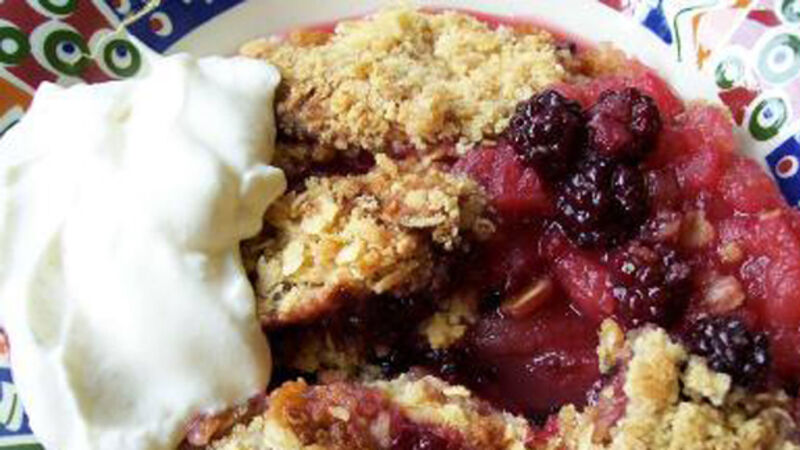Last chance to pick bountiful blackas

The glorious sunshine of September has enhanced and extended the harvest season of many crops including hedgerow fruits and if you have not yet picked some blackberries, get out therenow — as this is possibly the last week of the year that’s safe to do so.
Superstitions around the picking berries after the middle of October say they are to be left for the fairies and in English folklore it is said that after then, the devil has spat on them. This coincides with the fact that berries tend to go mouldy by that stage and are quite unappetising .
The blackberry bramble (Rubus fruticosus) is widespread with prolific berries that are among the best and most valued of our hedgerow fruits for various reasons.
They are easy to recognise, can be munched straight from the hedge, are tasty, nutritious and of course bountiful. They are generally in such abundance that it is possible to use them fresh in a host of tasty deserts and their berry-licious flavour can be enjoyed for weeks and months on end by making jams, jellies, chutneys, wine, and infusing them in vinegars.
They can also be frozen and used as desired throughout the year. Blackberries grow in large clusters. The lowest berry, right at the tip of the stalk, is the first to ripen and the fattest and sweetest of all. It is best to eat this raw.
Berries ripen gradually from August through September to early-winter. They change from green to red to black. The best flavoured fruits are those that ripen first and the berries thereafter are slightly less juicy and best used in jams and pies.
Blackberries are bursting full off berry goodenss being mineral rich and high in magnesium and potassium. They are an excellent source of dietary fibre and it is said that some varieties have more dietary fibre, weight for weight, than wholemeal bread.
They are a good source of Vitamin C, so feasting on blackberries is a pleasurable way to build up resistance to winter colds and flu. They are also rich in antioxidants which help in the prevention of cancer and heart diseases.
On a hedgerow near you, wild blackberries are there for the picking but it’s best to avoid polluted areas such as busy roadsides and fields, which have been sprayed with chemicals.
As blackberries are shallow rooted they are likely to absorb more pollutants than tree fruits and UK studies have identified heavy metal pollution in blackberries grown in urban areas but not in significant enough levels to threaten human health.
Stick to country lanes to avoid any risk or concerns. Because blackberries are thorny, it’s best to wear long trousers and sleeves to avoid any unwanted scratches. Look for berries with a bright black color. They should be clean, plump and fresh in appearance. Over ripe berries will have a dull colour.
Under ripe berries will be hard and bitter. Pick only completely ripe berries, which come off the cane readily with the slightest tug.
Handle blackberries gently as they are fragile. There is no need to wash blackberries before either using or freezing unless they have been picked in urban areas. Blackberries will keep in the refrigerator for about two days if they are unwashed and stored in an uncovered container.
Freezing berries for use throughout the winter means spreading them thinly on a tray and freezing in single layers before moving to freezer bags. This way the berries will not freeze together in a lump, so you can remove a handful for your porridge without thawing the rest.
Blackberries are extremely versatile. Many of our favourite traditional desserts are made with them – ice-cream, tarts, mousse, cheesecakes, pavlova etc. Often they are used in combination with windfalls or early cooking apples and if you collect a decent quantity, you’ll want to make some jam.
Blackberries are low in pecti so it’s a good idea to partner the berries with cooking apples to increase pectin. Blackberry and apple crumbles, pies, cobblers, muffins and fools are all delicious and the berries also make great chutneys and jellies for sweet and savoury use.
Of course, they are sublime when infused with vinegar or vodka. The very best blackberries can also be served raw and they make a pretty ingredient for a fruit salad or served with muesli for breakfast.
If you find the hard seeds in blackberries undesirable in pureed recipes such as ice cream, jam, smoothies or sauces, simply pass the blackberry puree through a strainer or sieve.





